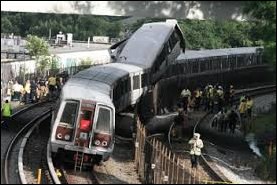 by Bill Tracy
by Bill Tracy
In Northern Virginia on Friday, the National Transportation Safety Board released a scathing final report on the Washington area Metro’s derailment problem with its newer. 7000-Series railcars. The NTSB’s media presentation by Chair Jennifer Homendy can be found on YouTube. NTSB also faulted Metro’s safety culture.
My prior layman’s understanding, from local news coverage, had been that Metro (aka WMATA) had no idea what was causing the derailment problem.
I was dumbfounded to learn that since 2014, WMATA has been aware of the wheel “migration” problem on its railcars. In hindsight, WMATA had not been designing the Metro railcars with adequate “press force” of the wheels onto the axles. This problem allows some railcar wheels, over time, to spread out — wider than the tracks — causing derailments. About two-thirds of the 748 new 7000-Series railcars were built with an inadequate press force spec, before the spec was updated by WMATA. As expected, it was one of the earlier 7000-series cars that derailed in Arlington in 2021, causing all of the new 7000-series cars to be taken out of service.
The fix is to re-build the wheel sets of the earlier 7000-series cars to bring them up to the new standard, presumably at great expense. WMATA is trying to blame the manufacturer, Kawasaki, for the issue. Kawasaki, however, reports that they built the railcars to final specs requested by Metro-WMATA. The courts will presumably have to settle the “who pays” issue.
NTSB apparently also faults the Federal Transit Administration (FTA) for lack of regulations concerning commuter railcar design and safety. Apparently, the Washington Metro system employs so-called “heavy” railcars weighing over 20,000-lbs, which is rare. Los Angeles is apparently one of the few other cities that also has the heavy railcars.
The good news is that NTSB’s Homendy gives current Metro management (CEO Randy Clarke) a good report card for finally facing up to the derailment issue. Problem solved? Time will tell.
Bill Tracy, a retired engineer, lives in Northern Virginia.

Leave a Reply
You must be logged in to post a comment.